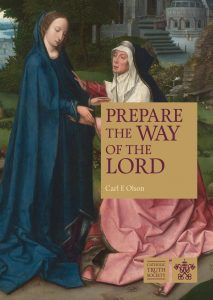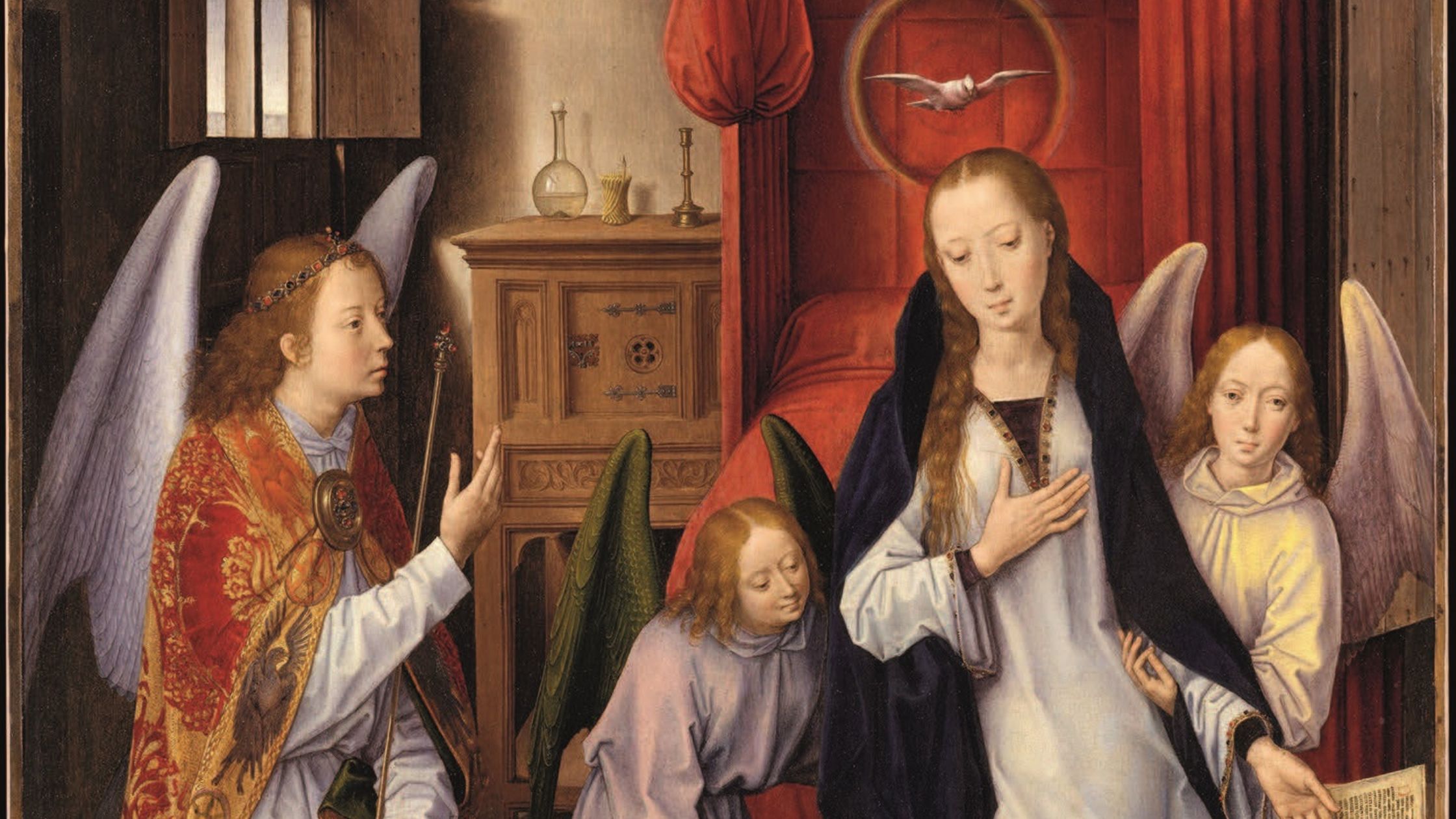Third Sunday of Advent – Year B
First Reading: Isaiah 61:1-2,10-11
I exult for joy in the Lord.
The spirit of the Lord has been given to me,
for the Lord has anointed me.
He has sent me to bring good news to the poor,
to bind up hearts that are broken;
to proclaim liberty to captives,
freedom to those in prison;
to proclaim a year of favour from the Lord.
‘I exult for joy in the Lord,
my soul rejoices in my God,
for he has clothed me in the garments of salvation,
he has wrapped me in the cloak of integrity,
like a bridegroom wearing his wreath,
like a bride adorned in her jewels.
‘For as the earth makes fresh things grow,
as a garden makes seeds spring up,
so will the Lord make both integrity and praise
spring up in the sight of the nations.’
Responsorial Psalm: Lk 1:46-50,53-54. R. Is 61:10
R. My soul rejoices in my God.
My soul glorifies the Lord,
my spirit rejoices in God, my Saviour.
He looks on his servant in her nothingness;
henceforth all ages will call me blessed. R.
The Almighty works marvels for me.
Holy his name!
His mercy is from age to age,
on those who fear him. R.
He fills the starving with good things,
sends the rich away empty.
He protects Israel, his servant,
remembering his mercy. R.
Second Reading: 1 Thessalonians 5:16-24
Be happy at all times; pray constantly; and for all things give thanks to God, because this is what God expects you to do in Christ Jesus.
Never try to suppress the Spirit or treat the gift of prophecy with contempt; think before you do anything – hold on to what is good and avoid every form of evil.
May the God of peace make you perfect and holy; and may you all be kept safe and blameless, spirit, soul and body, for the coming of our Lord Jesus Christ. God has called you and he will not fail you.
Gospel: John 1:6-8,19-28
A man came, sent by God.
His name was John.
He came as a witness,
as a witness to speak for the light,
so that everyone might believe through him.
He was not the light,
only a witness to speak for the light.
This is how John appeared as a witness. When the Jews sent priests and Levites from Jerusalem to ask him, ‘Who are you?’ he not only declared, but he declared quite openly, ‘I am not the Christ.’ ‘Well then,’ they asked ‘are you Elijah?’ ‘I am not’ he said. ‘Are you the Prophet?’ He answered, ‘No.’ So they said to him, ‘Who are you? We must take back an answer to those who sent us. What have you to say about yourself?’ So John said, ‘I am, as Isaiah prophesied:
a voice that cries in the wilderness:
Make a straight way for the Lord.’
Now these men had been sent by the Pharisees, and they put this further question to him, ‘Why are you baptising if you are not the Christ, and not Elijah, and not the prophet?’ John replied, ‘I baptise with water, but there stands among you – unknown to you – the one who is coming after me; and I am not fit to undo his sandal-strap.’ This happened at Bethany, on the far side of the Jordan, where John was baptising.
Reflection
“My spirit exults in God, my Saviour.” (Lk 1:47)
Gaudete Sunday is a day of joy and rejoicing (the Latin word for “rejoice” is gaudere), offering an even more heightened sense of promise and anticipation as Christmas approaches. This Third Sunday of Advent, observed Monsignor Ronald Knox,
interrupts us when we are all telling one another that the world is dust and ashes, the ante-room of eternity. Joy is woven into the pattern as well as sorrow; to rejoice is more than a grudging permission; it is, at times, a sort of Christian duty.
There is a temptation to associate joy solely with our emotions. But joy, while certainly shown at times through our emotional responses, goes deeper. It is the response of our heart, mind and soul to the grace of God, the recognition of his saving power, mercy and love. In the opening chapter of the Gospel of Luke, the Blessed Virgin Mary says, “My soul rejoices in my God”, or “My spirit exults in God, my Saviour.”
This echoes the joyful song of Hannah, who said, “My heart exults in the Lord, my horn is exalted in the Lord”, after having dedicated her son Samuel to the Lord (1 S 1:27–2:1). The “spirit” is the essence of life, and Luke is likely emphasising the rational, contemplative mind.
In short, to rejoice is to recognise and embrace the truth about God’s work. Thus, the Apostle Paul told the Christians at Thessalonica, “Rejoice always. Pray without ceasing.” But how can we always be joyful and never stop praying? By recognising that being a Christian does not require us to feel a certain way at all times, but rather to think with the mind of Christ and obey the will of God. A husband and wife truly dedicated to their marriage do not attempt merely to maintain the emotions experienced on their honeymoon, but pursue an even deeper nuptial bond, rooted in a committed, willed love.
Throughout Advent, two people are held up as examples of this faithful love. The first, of course, is John the Baptist, the focus of both last week’s and today’s Gospel readings. The emphasis in today’s reading from the opening chapter of the Gospel of John is on testimony, or witness. The Greek word – martyria – for “testify” or “witness” is also the root word for “martyr”, and it appears nearly thirty times in the Fourth Gospel, as well as several times in the Book of Revelation.
What does John the Baptist testify to? The person of Jesus Christ, described in the prologue of the Fourth Gospel as light: “to the light, so that all might believe through him”. The Apostle John had also witnessed the light of Christ; in fact, he described himself as the “disciple whom Jesus loved” (Jn 13:23; 20:2; 21:7, 20). But John the Baptist, the cousin of Jesus, had a most unique testimony, for he had recognised the Saviour while both were still in the womb (Lk 1:41). He then gave witness not only by word but also by deed: first, through preaching and baptism, then finally through martyrdom (Mk 6:17-29).
The second person, now emerging more fully in the Advent readings, is the Mother of God. Her “Magnificat” is also a joyful expression of witness, the testimony of the perfect disciple: “My soul proclaims the greatness of the Lord; my spirit rejoices in God my saviour.” Mary, wrote St Bede, proclaimed both her humility and God’s holiness:
She demonstrates that in her own judgement she was indeed Christ’s humble handmaid, but with respect to heavenly grace she pronounces herself all at once lifted up and glorified to such a degree that rightly her pre-eminent blessedness would be marvelled at by the voices of all nations.
This, then, is the source and focus of joy: God has come and is coming to save us from sin, despair and death. As St Paul explained, God brings the gift of holiness, so that we may, “whole spirit and soul and body, be kept blameless at the coming of our Lord Jesus Christ” (1 Th 5:23).
Prayerfully discover the meaning of Christmas:
 Prayerfully discover the meaning of Christmas with this collection of meditations on the Scriptures and prayers of the Advent season. Reflecting upon the Sunday Gospels, Carl E Olson highlights their depth and helps us to apply the Scriptures to our own lives.
Prayerfully discover the meaning of Christmas with this collection of meditations on the Scriptures and prayers of the Advent season. Reflecting upon the Sunday Gospels, Carl E Olson highlights their depth and helps us to apply the Scriptures to our own lives.
Olson continues this Advent meditation by offering a line-by-line contemplation on the Hail Mary, illuminating the significance of each word so as to deepen our experience of this integral prayer. By praying the Hail Mary mindfully, we discover how to walk through Advent with Mary, ready to welcome her Son at Christmas.
Click here to order now for more Advent meditations and reflections
